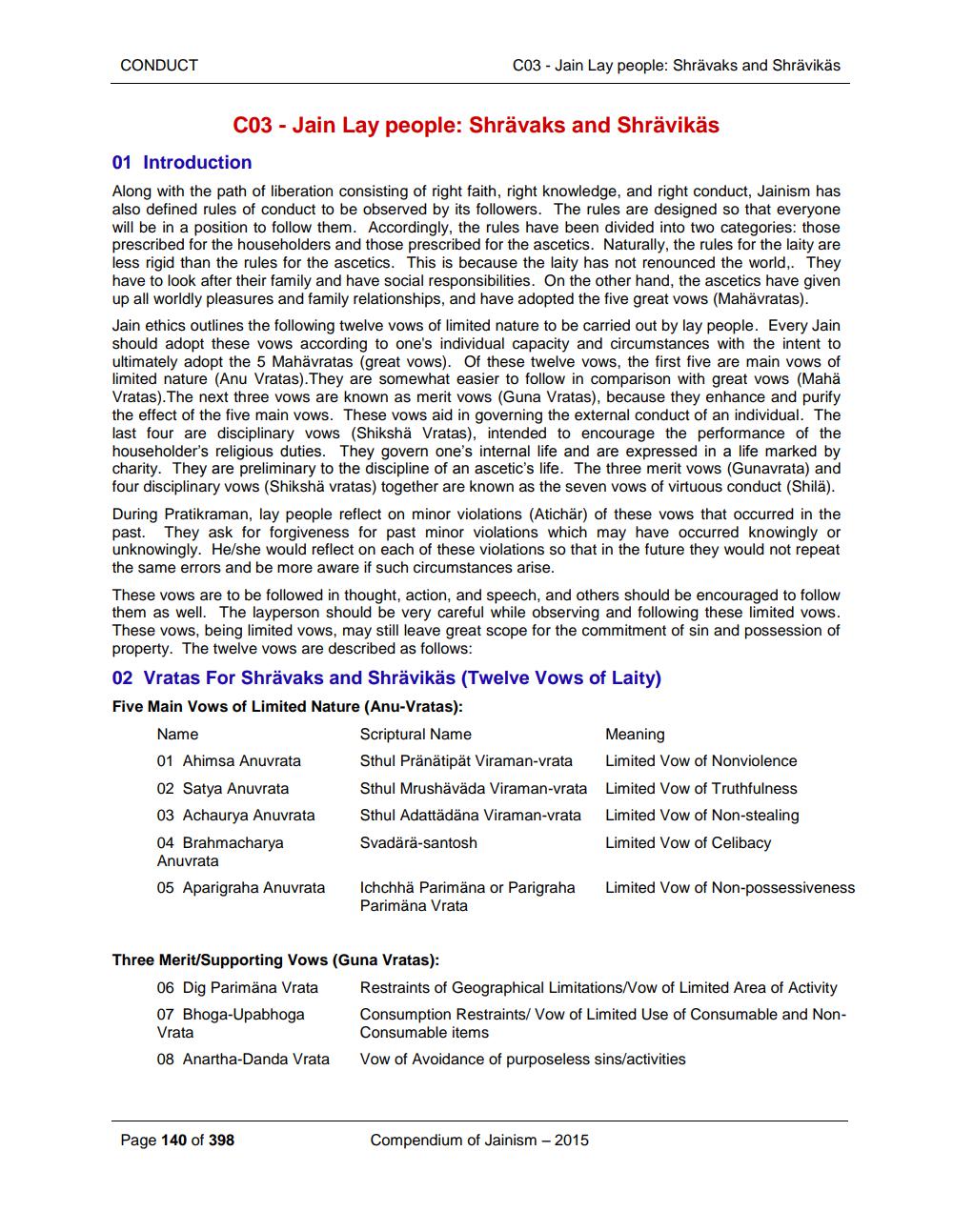________________
CONDUCT
CO3 - Jain Lay people: Shrävaks and Shrävikäs
C03 - Jain Lay people: Shrävaks and Shrävikäs 01 Introduction Along with the path of liberation consisting of right faith, right knowledge, and right conduct, Jainism has also defined rules of conduct to be observed by its followers. The rules are designed so that everyone will be in a position to follow them. Accordingly, the rules have been divided into two categories: those prescribed for the householders and those prescribed for the ascetics. Naturally, the rules for the laity are less rigid than the rules for the ascetics. This is because the laity has not renounced the world. They have to look after their family and have social responsibilities. On the other hand, the ascetics have given up all worldly pleasures and family relationships, and have adopted the five great vows (Mahävratas). Jain ethics outlines the following twelve vows of limited nature to be carried out by lay people. Every Jain should adopt these vows according to one's individual capacity and circumstances with the intent to ultimately adopt the 5 Mahävratas (great vows). Of these twelve vows, the first five are main vows of limited nature (Anu Vratas). They are somewhat easier to follow in comparison with great vows (Mahä Vratas). The next three vows are known as merit vows (Guna Vratas), because they enhance and purify the effect of the five main vows. These vows aid in governing the external conduct of an individual. The last four are disciplinary vows (Shikshä Vratas), intended to encourage the performance of the householder's religious duties. They govern one's internal life and are expressed in a life marked by charity. They are preliminary to the discipline of an ascetic's life. The three merit vows (Gunavrata) and four disciplinary vows (Shikshä vratas) together are known as the seven vows of virtuous conduct (Shilä). During Pratikraman, lay people reflect on minor violations (Atichär) of these vows that occurred in the past. They ask for forgiveness for past minor violations which may have occurred knowingly or unknowingly. He/she would reflect on each of these violations so that in the future they would not repeat the same errors and be more aware if such circumstances arise These vows are to be followed in thought, action, and speech, and others should be encouraged to follow them as well. The layperson should be very careful while observing and following these limited vows. These vows, being limited vows, may still leave great scope for the commitment of sin and possession of property. The twelve vows are described as follows: 02 Vratas For Shrävaks and Shrävikäs (Twelve Vows of Laity) Five Main Vows of Limited Nature (Anu-Vratas): Name Scriptural Name
Meaning 01 Ahimsa Anuvrata Sthul Pränätipät Viraman-vrata Limited Vow of Nonviolence 02 Satya Anuvrata
Sthul Mrushäväda Viraman-vrata Limited Vow of Truthfulness 03 Achaurya Anuvrata Sthul Adattädäna Viraman-vrata Limited Vow of Non-stealing 04 Brahmacharya Svadärä-santosh
Limited Vow of Celibacy Anuvrata 05 Aparigraha Anuvrata Ichchhä Parimana or Parigraha Limited Vow of Non-possessiveness
Parimäna Vrata
Three Merit/Supporting Vows (Guna Vratas):
06 Dig Parimäna Vrata Restraints of Geographical Limitations/Vow of Limited Area of Activity 07 Bhoga-Upabhoga Consumption Restraints/Vow of Limited Use of Consumable and NonVrata
Consumable items 08 Anartha-Danda Vrata Vow of Avoidance of purposeless sins/activities
Page 140 of 398
Compendium of Jainism - 2015




